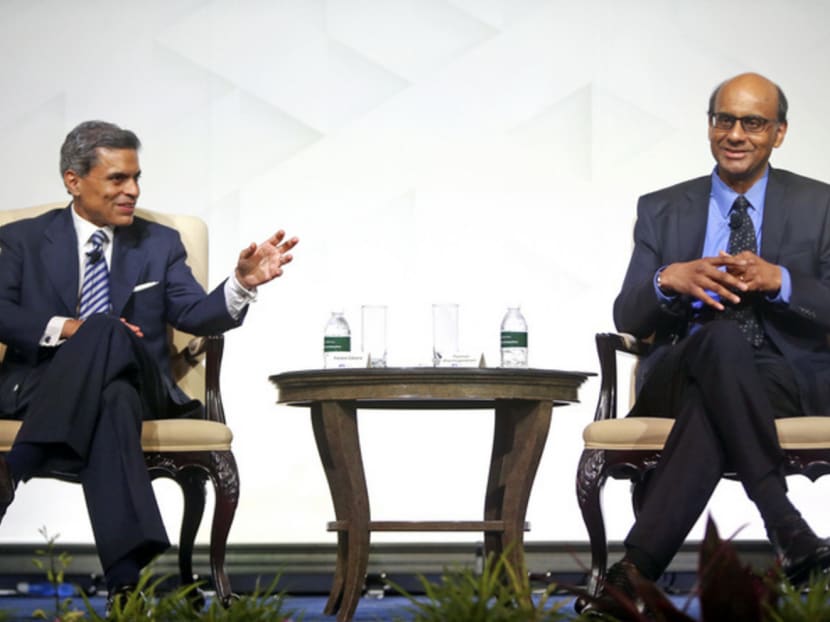Education system ‘has to evolve’ to spur creativity
SINGAPORE — The Republic’s educational system has served the country well in increasing social mobility, but it will also have to evolve to spur innovation and create a sense of individuality among Singaporeans, said Deputy Prime Minister Tharman Shanmugaratnam yesterday.

(L-R) Fareed Zakaria hosting a conversation with DPM Tharman Shanmugaratnam during the SG50+ Conference at the Shangri-La Hotel.
SINGAPORE — The Republic’s educational system has served the country well in increasing social mobility, but it will also have to evolve to spur innovation and create a sense of individuality among Singaporeans, said Deputy Prime Minister Tharman Shanmugaratnam yesterday.
Speaking at a dialogue session during the SG50+ conference organised by the Institute of Policy Studies, Mr Tharman, who was Education Minister from 2003 to 2008, said he “makes no excuses” for what the system had done to uplift the Singapore population. “But that spirit of individuality, that free play of the mind, isn’t best developed in a system that is highly competitive and focused on tests,” said the minister.
He was responding to a question from American journalist Fareed Zakaria, who chaired the session, on whether Singapore needs to shift away from a system of testing to encourage creativity.
Mr Tharman said: “The toughest question to ask ourselves … is not what we add to the education system, but what we subtract.” He pointed out that the task “requires some courage”, given that Singapore is doing well, including in international tests.
Nevertheless, there is a need to make room for experiences outside the curriculum, such as the time to reflect, explore and build fellowship with others, he said. “We’ve got to take something out, accept that there is going to be a trade-off, we are not going to be as good in certain things. But we’ve got to provide that space and watch it as we go,” said Mr Tharman, who noted that Singapore is starting from a strong foundation in education.
He added that having a sense of individuality is not at odds with having a sense of fellowship as one grows up with people from different backgrounds.
Dr Zakaria noted the importance of instilling in people a “sense of challenging authority”. “Is it not tied with a political system that does not encourage dissent either?” he said.
In response, Mr Tharman agreed that there must be a culture “starting from young, pre-school, primary school, where kids speak up”.
He said: “You don’t need to always make sense at that age, you don’t need to speak logically, but you’ve got to develop a mind of your own. There’s something to it.”
He added: “I think what it implies for political culture or the broader culture — we need some humility on this. You look at Switzerland, a highly innovative place, they’re not just tinkering with watches you know, they’re highly innovative people.”
Noting that the Swiss culture is different from the American culture, Mr Tharman said there are very strong social norms in Switzerland and its people have very deep respect for one another. “You don’t create noise beyond a certain hour at night, you don’t make life difficult for your neighbours ... there’s a certain sameness about us (Singaporeans),” he said.
Dr Zakaria referred to how the United States had fared poorly in international academic tests, but is highly innovative as a country.
However, Mr Tharman noted that the success stories in the US had come from a small portion of the population, who typically had gone to private schools and Ivy League universities.
While there is inequity in the American public-school system, Singapore focuses on meritocracy to give everyone a fair chance of success regardless of his background, he said.
Still, Mr Tharman recognised the need for a new culture and new set of skills for Singaporeans to spur innovation, as the Republic moves into its next phase of development. The younger generation is already showing greater willingness to venture into the unknown, he added.






